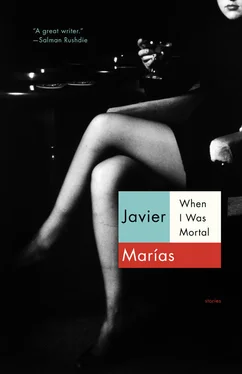Javier Marias - When I Was Mortal
Здесь есть возможность читать онлайн «Javier Marias - When I Was Mortal» весь текст электронной книги совершенно бесплатно (целиком полную версию без сокращений). В некоторых случаях можно слушать аудио, скачать через торрент в формате fb2 и присутствует краткое содержание. Год выпуска: 2012, Издательство: Vintage Espanol, Жанр: Современная проза, на английском языке. Описание произведения, (предисловие) а так же отзывы посетителей доступны на портале библиотеки ЛибКат.
- Название:When I Was Mortal
- Автор:
- Издательство:Vintage Espanol
- Жанр:
- Год:2012
- ISBN:нет данных
- Рейтинг книги:3 / 5. Голосов: 1
-
Избранное:Добавить в избранное
- Отзывы:
-
Ваша оценка:
- 60
- 1
- 2
- 3
- 4
- 5
When I Was Mortal: краткое содержание, описание и аннотация
Предлагаем к чтению аннотацию, описание, краткое содержание или предисловие (зависит от того, что написал сам автор книги «When I Was Mortal»). Если вы не нашли необходимую информацию о книге — напишите в комментариях, мы постараемся отыскать её.
. Plots turn on curious exigencies — a woman about to star in her first porn film; a night doctor who adds new meaning to "specialist"; a ghost whose neglect is greatly resented. "In the space of ten or twenty pages," as the
remarked, "Marías contrives to write a novel." "The short story fits Marías like a glove," as
noted, and these stories have been acclaimed as "dazzling" (
); "formidably intelligent" (
); and "startling" (
).
When I Was Mortal — читать онлайн бесплатно полную книгу (весь текст) целиком
Ниже представлен текст книги, разбитый по страницам. Система сохранения места последней прочитанной страницы, позволяет с удобством читать онлайн бесплатно книгу «When I Was Mortal», без необходимости каждый раз заново искать на чём Вы остановились. Поставьте закладку, и сможете в любой момент перейти на страницу, на которой закончили чтение.
Интервал:
Закладка:
It was more or less then, that, unexpectedly (only months, not years, had passed since her marriage), Silvia, during a time when her Islamic husband was immobilized due to a fall down the stairs in their new conjugal home (so many houses in Paris still do not have a lift), she happened to meet in a cinema (to which this time she went alone) a young man of her own age for whom, after a few more weeks of cinemas and cafés and marital immobility, she had conceived such a passion that she had no option but to propose a quickie divorce and to acknowledge her mistake (that is, her impatience or her weakness or her submission to habit, or her resignation). The young man was rather richer than the old writer: he was deputy director of a canning factory for mussels and tuna and was constantly visiting far-off countries in order to make acquisitions or to carry out murky deals. Silvia went with him to China and then Korea and later to Vietnam. It was in this latter country that, for no known reason, the deputy director of the canning factory fell gravely ill and had to postpone his many deals during the two unplanned-for weeks that it took him to recover.
I had never spoken to Giulia about Silvia or to Silvia about Giulia, because neither of them is interested in other people’s lives and it seems impolite to entrust to other ears things which, in principle, were intended only for mine. Now, however, I have my doubts, because this summer, I visited Giulia in Paris and her situation has taken a rather worrying turn: ever since, three months ago, she and the false student or psychologist decided to live in the same apartment, he has turned out to be a very nasty piece of work indeed: he hates books now and has forced Giulia to get rid of her library; he beats her, he’s violent; and recently, while she was pretending to be asleep, she has twice seen him standing at the foot of the bed stroking a razor (once, she says, he was sharpening it on a strap like an old-fashioned barber). Giulia trusts that it will be a passing phase, a consequence of the enigmatic illness contracted in Thailand or some upset caused by the unbearable heat of this never-ending summer. I hope so, but given that Silvia and her canner are thinking of moving in together, perhaps I should speak to her now, even if only so that she can save her library and try to persuade her man to change to an electric razor.
THE HONEYMOON
MY WIFE HAD suddenly felt ill and we had rushed back to our hotel room, where she had lain down, shivering and feeling slightly nauseous and feverish. We didn’t want to call a doctor immediately in case it passed off of its own accord and because we were on our honeymoon, and on honeymoon you really don’t want the interference of a stranger, even if it’s for a medical examination. It was probably a minor stomach upset, colic or something. We were in Seville, in a hotel sheltered from the traffic by an esplanade that separated it from the street. While my wife was sleeping (she seemed to fall asleep as soon as I had undressed her and covered her up), I decided to keep quiet, and the best way to do that and not be tempted to make any noise or to talk to her out of sheer boredom was to go over to the balcony and watch the people passing by, the people of Seville, how they walked and how they dressed, how they talked, even though, given the relative distance of the street and the traffic, you could hear only a murmur. I looked without seeing, like someone who arrives at a party from which he knows the only person who really interests him will be absent, having stayed at home with her husband. That one person was with me, behind me, watched over by her husband. I was looking outside, but thinking about what was happening inside, however, I did suddenly pick out one person, and I picked her out because unlike the other people, who walked by and then disappeared, that person remained motionless in one place. It was a woman who, from a distance, looked about thirty, and was wearing an almost sleeveless blue blouse, a white skirt and white high heels. She was waiting for someone, her attitude unmistakably that of someone waiting, because every now and then she would take two or three steps to the right or the left, and on the last step she would drag the stiletto heel of one foot or the other, a gesture of suppressed impatience. On her arm she carried a large handbag, like the bags that mothers, my mother, carried when I was a child, a large black handbag carried on the arm, not slung over the shoulder the way women wear them now. She had strong legs that dug solidly into the pavement each time she returned to the spot where she had chosen to wait after that minimal movement to either side of two or three steps, dragging her heel on the final step. Her legs were so strong that they cancelled out or assimilated her high heels, it was her legs that dug into the pavement, like a knife into wet wood. Sometimes she would bend one leg in order to look behind and smooth her skirt, as if she feared that some crease might be spoiling the line of her skirt at the rear or perhaps she was simply adjusting the elastic of a recalcitrant pair of knickers through the fabric covering them.
It was growing dark, and the gradually fading light made her seem to me ever more solitary, more isolated and more condemned to wait in vain. Her date would not arrive. She was standing in the middle of the pavement, she did not lean against the wall as those who wait usually do, so as not to get in the way of those passers-by who are not waiting, which is why she had trouble avoiding them, one man said something to her and she responded angrily and threatened him with her voluminous bag.
Suddenly she looked up, at the third floor where I was standing on the balcony, and she seemed to fix her eyes on me for the first time. She peered at me, as if she were short-sighted or were looking through grubby contact lenses, she screwed up her eyes a little to see better, it was, it seemed, me she was looking at. But I knew no one in Seville, more than that, it was the first time I had ever been to Seville, on my honeymoon, with my brand-new wife lying ill on the bed behind me, I just hoped it was nothing serious. I heard a murmur coming from the bed, but I didn’t turn round because it was a moan made in her sleep, one quickly learns to distinguish the sounds the person one sleeps with makes in their sleep. The woman had taken a few more steps, this time in my direction, she was crossing the street, dodging the cars, not bothering to look for traffic lights, as if she wanted to get closer quickly in order to find out, to get a better view of me on my balcony. She walked slowly, however, and with difficulty, as if she were unaccustomed to wearing high heels or as if her striking legs weren’t used to them, or as if her handbag threw her off balance or as if she were dizzy. She walked rather in the way that my wife had walked after being taken ill, when she came into the room, I had helped her to undress and put her to bed, I had covered her up. The woman had just crossed the street, now she was closer but still some way off, separated from the hotel by the ample esplanade that set it back from the traffic. She continued looking up at me or at where I was, at the building in which I was staying. And then she made a gesture with her arm, a gesture that neither greeted nor beckoned, I mean it wasn’t the way one would beckon to a stranger, it was a gesture of appropriation and recognition, as if I were the person she had been waiting for and as if her date was with me. It was as if with that gesture of her arm, finished off by a swift flourish of the fingers, she wanted to grab hold of me and say: “Come here,” or “You’re mine”. At the same time she shouted something that I couldn’t hear and from the movement of her lips I understood only the first word and that word was “Hey!” uttered with great indignation as was the rest of the phrase that failed to reach my ears. She continued to advance, she smoothed the rear of her skirt more earnestly now because it seemed that the person who would judge her appearance was there before her, the person she was waiting for could now appreciate the way her skirt fell. And then I did hear what she was saying: “Hey, what are you doing up there?” The shout was very audible now, and I could see the woman better. Perhaps she was older than thirty, she still had her eyes screwed up, but they seemed light in colour to me, grey or hazel, and she had full lips, a rather broad nose, her nostrils flaring vehemently, out of anger, she must have spent a long time waiting, far longer than the time that had elapsed since I had picked her out. She stumbled as she walked, she tripped and fell to the ground, instantly dirtying her white skirt and losing one of her shoes. She struggled to her feet, as if she feared getting her foot dirty too, now that her date had arrived, now that she needed to have clean feet just in case the man she had arranged to meet should see them. She managed to get her shoe back on without putting her foot on the ground, she brushed down her skirt and shouted: “What are you doing up there! Why didn’t you tell me you’d already gone up? I’ve been waiting for you here for an hour!” And as she said that, she repeated the same grasping gesture, a bare arm beating the air and the quick flourish of fingers that accompanied it. It was as if she were saying: “You’re mine” or “I’ll kill you,” as if with that gesture she could grab me and drag me towards her, like a claw. This time she shouted something and she was so close I was afraid she might wake my wife.
Читать дальшеИнтервал:
Закладка:
Похожие книги на «When I Was Mortal»
Представляем Вашему вниманию похожие книги на «When I Was Mortal» списком для выбора. Мы отобрали схожую по названию и смыслу литературу в надежде предоставить читателям больше вариантов отыскать новые, интересные, ещё непрочитанные произведения.
Обсуждение, отзывы о книге «When I Was Mortal» и просто собственные мнения читателей. Оставьте ваши комментарии, напишите, что Вы думаете о произведении, его смысле или главных героях. Укажите что конкретно понравилось, а что нет, и почему Вы так считаете.












